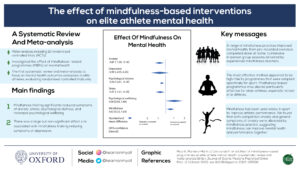The question of how to improve mental health is receiving increased attention across all walks of life. Placing the spotlight on elite sport, some interesting challenges arise. Athletes are admired, sometimes even adored, for their physical and psychological strength. Conflicts arise, however, when the very thing athletes are inherently good at (enduring adversity to achieve success) stands in the way of them identifying and acknowledging vulnerability and then seeking mental health support. As a former professional athlete and now a PhD researcher in this area, I believe that understanding the relationship between performance and mental health is key to implementing effective mental health strategies. This blog provides an overview of our recently published study exploring the effect of mindfulness-based programmes on elite athlete health – available here.
Why is this study important?
Mindfulness is an innate ability that is underpinned by skills that can be learned, practised, and enhanced. It entered western medicine in the form of group-based stress reduction programmes where participants are taught meditative practices. The aim is to improve their ability to focus on the present moment and be non-judgmentally aware of the thoughts and feelings that arise. Mindfulness has since become a popular and widely recommended means of improving mental health, with many other mindfulness-based programmes emerging, including some specifically designed for athletes.
Mindfulness-based approaches have also been used in sport as a way to improve athletic performance, so it’s feasible that they have the potential to improve both mental health and performance. By delivering the programmes to groups, rather than on an individual basis, some of the stigma associated with seeking mental health support could also be reduced. Our study evaluated the best available evidence to determine whether mindfulness-based programmes were an effective method of improving elite athlete mental health.
How did the study go about this?
Following guidelines for conducting a systematic review, we extensively searched the available literature for studies that randomly assigned half a group of athletes to a mindfulness-based programme and the other half to an active or non-active control (e.g., relaxation, or just training as usual). We included 12 studies that reported relevant mental health assessment scores. Results were extracted from each study and pooled together to allow the data to be analysed as a single dataset. We then compared the mental health results of 314 athletes that had undergone a mindfulness-based programme with the results of the 300 athletes that were in the control groups.
What did the study find?
Overall, athletes that underwent the mindfulness-based programmes reported improved mental health compared to the athletes in the control groups. Significantly reduced symptoms of stress, psychological distress, and anxiety were reported. Both general symptoms of anxiety and competition anxiety reduced, indicating that mindfulness-based programmes could support performance alongside mental health. Significant increases in psychological wellbeing and mindfulness were also found. Symptoms of depression reduced, but this result was not statistically significant meaning further research measuring depression is required. Only four percent of athletes assigned to the mindfulness-based programme dropped out compared to nine percent in the control group. This tells us that these programmes are an acceptable form of intervention in elite sport settings.
We also found that mindfulness-based programmes designed specifically for sport may be the most effective, and that effectiveness increases as athlete age increases. The results were particularly strong in one study that assessed retired elite athletes.
What are the key take-home points?
Mindfulness-based programmes improved mental health overall. By developing programmes that are specifically adapted for athletes, and delivering them in group settings with a focus on performance enhancement, it may be possible to broadly improve the mental health of many athletes at once. Mindfulness-based programmes also have the potential to navigate some of the barriers athletes face when seeking-help, and might contribute to reducing some of the stigma around mental health in elite sport.
Infographic:
